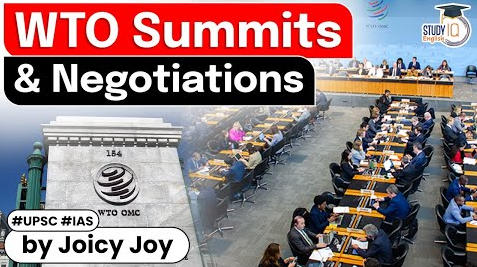Table of Contents
MOST FAVOURED NATIONS
- In international economic relations and international politics, most favoured nation (MFN) is a status or level of treatment accorded by one state to another in international trade.
- The country which is the recipient of this treatment must nominally receive equal trade advantages as the “most favoured nation” by the country granting such treatment.
- Under rules of the World Trade Organisation (WTO), a member country is not allowed to discriminate between trade partners and if the special status is granted to one trade partner, the country is required to extend it to all members of the WTO.
- MFN is a non-discriminatory trade policy as it ensures equal trading among all WTO member nations rather than exclusive trading privileges.
- The advantages of the most-favoured nations are:
- These nations get access to a wider market for better trade.
- They pay a lesser cost on their exports due to the reduction in trade barriers.
- Due to the above opportunities, they get better options in terms of growth in business and competitiveness.
LEAST DEVELOPED COUNTRIES
- Identified by UN Economic and Social Council ( ECOSOC)
- LDCs economic growth can increase if they export more, so WTO agreement permits other countries to give duty free quota free access to exports from LDC and is not considered a violation.
DOHA DEVELOPMENT ROUND
- Doha Round negotiations have been stalled as the participating countries could not reach a consensus over trade negotiations with major differences between developed and developing countries.
- The developed countries especially EU, the USA, Canada and Japan had differences with developing countries (India, Brazil, China, South Africa) arguments over Special Safeguard Mechanism (SSM)
- The negotiations considered in the Doha Round were taken up in Geneva in 2008 but were again stalled due to the lack of consensus on SSM.
What is a Special Safeguard Mechanism?
- It is a mechanism used by countries to put a restraint on international trade to protect domestic industries from foreign competition.
- With a focus on WTO, a participating nation can take a safeguard action, such as restricting imports of a product temporarily to protect a domestic industry from an increase in imports causing or threatening to cause injury to domestic production.
FOOD SUBSIDIES AND PEACE CLAUSE
- Under WTOs Agreement on Agriculture (AOA), 1st and 3rd world countries are required to limit their food subsidies to 5% and 10% respectively to their value of agriculture production.
- In absolute quantitative terms USAs 10% will be much bigger than Indias 10%.
- 1st world countries are able to give large subsidies and export it to 3rd world countries at cheaper price ruining local farmers.
- In India there is a large population of poor farmers and Govt needs to support them with MSP and NFSA for malnourished poor families.
- WTO then gave Peace clause for developing countries, an immunity to give any amount of subsidy for their food programs
- Developed countries cannot impose countervailing duty or complaint about it to WTO.
FOOD SUBSIDIES : CAIRNS GROUP
- Agriculture export countries’ group members (20 members)
- Argentina, Australia, Bolivia, Brazil, Canada etc
- They want to WTO members to reduce Agricultural subsidies.
- India is not a member.
BALI PACKAGE AND TRADE FACILITATION AGREEMENT
- Requires member countries to reduce their bureaucratic delays, red tapes in import-export goods.
- They have set up online portal where traders can seek permissions, pay fees, custom duties, self declaration forms etc.
- India and others ratified it in 2016.
- TFA became effective in 2017
- India set up NCTF ( National Committee on Trade Facilitation) under Cabinet Secretary
- Peace clause on subsidies.
NAIROBI PACKAGE AND SSM
- Extended peace clause for ‘x’ years.
- Members must stop subsidy on agricultural export.
- 1st world countries= immediately
- 3rd world countries= relaxed deadline.
- If there is a surge cheap Agro Products of exports from 1st to 3
- 3rd can put temporary tariff to protect their farmers.
BUENOS AIRES SUMMIT (failed)
- Food subsidy related reforms remained inconclusive
- USA-EU were keen on new agreement on e-commerce
- Members also failed to conclude negotiations related to SSM
KAZAKHSTAN SUMMIT (2020)
- was cancelled due to the pandemic
Indian Economy | Free PDF




























 WhatsApp
WhatsApp